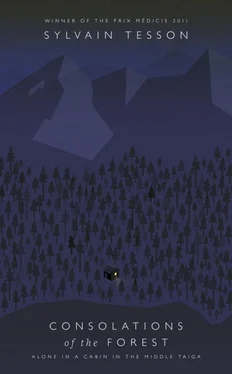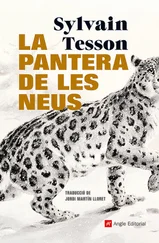21 JULY
Not one bird is singing. Not one ripple on the lake. Fog has swallowed up the world.
22 JULY
Their silent approach takes me by surprise: I become aware of their presence only when I hear the kayaks scraping over the shingle. Two colossi with shaved heads. They have bloodthirsty smiles but the gentlest of eyes. They’re paddling to Olkhon Island at the rate of about thirty miles a day. They ask me for some tea, and while the kettle is coming to a boil, they announce that they are Shivaists and are travelling along the lakeshore to find sacred sites, since they consider Baikal to be the original birthplace of their god. The funny thing is that they look like Special Forces killers.
My ten years of education with the Brothers have left me enough residual patience to get through the spiritual mishmash, liberally sprinkled with Sanskrit, that Sasha expounds to me for an hour, the gist of which is that Baikal’s mountains are linked to sacred Mount Meru, that the Ural Mountains are a world hot-spot for celto-cosmic revelations, and that Zarathustra built the kurgans – those prehistoric burial mounds found in southern Russia and Ukraine – on the Indo-Sarmatian plains. I admire these believers who speak of such things with the same aplomb as if they’d just split a beer with God in the cabin next door. Since the collapse of the USSR, New Age theories have been all the rage with Russians. After all, something had to fill the mystic vacuum left by the debunking of socialist dogma. Russians love esoteric explanations of the world and will never shrink from swallowing whole any of those theories that professional occultists would never dare even to mention in Western Europe. Russians aren’t the sons of Rasputin for nothing.
It’s a lovely idea, sailing around while trying to recognize in the shape of a landscape the physical transcription of a legend. This spiritual and symbolic distortion of geography takes one’s breath away. Paddling along, my two friends detect signs, track correspondences. In a prominent hill they see a lingam; in the crenellation of a ridge, the trident of Shiva; and in a cabin, the ‘centre of effort’ where all forces are thought to concentrate.
After supper, Sasha and his disciple sit in the lotus position on the beach and recite a Hindu mantra. Sasha blows into his Tibetan conch shell. The bleating awakens Bek, who starts howling.
‘My dog doesn’t like the sound of the conch,’ I say.
Sasha gives me a strange look.
‘Maybe he isn’t a dog…’
They tell me again that the North Cedar cabin is on an ‘energy knot’ of great intensity. They head out southwards. The blasts on the conch echo in the distance.
23 JULY
I’m paddling towards the River Lednaya. The lake smells like a dead body. The fog is back. The forest appears, withdraws, returns. At the river, I fish from the rocks, then dine on the product of my patience. Tonight my bivouac is the quintessence of campsites: lapping water, a meadow at the base of a cliff overlooking a calm lake, with a few birches to break up the breeze. The fish are roasting on the fire while the dogs wait for their share, and a moon the colour of a delicate iced biscuit is lounging among the clouds. I smoke a Partagás. Cigars are consecrated by the places where they are smoked: my memory is geographic. Cigars retain the atmosphere and genius of places even better than faces and conversations can.
The only thing missing this evening is the woman of my dreams.
24 JULY
Dawn, and the sound of an engine. It’s Volodya, who has come to spread a net at the mouth of the Lednaya. I hail him from the top of the cliff. We talk for an hour, sharing tomatoes on the bow deck of the canoe. In his discussions of the immediate , the French philosopher and musicologist Vladimir Jankélévitch speaks of that faculty the Russians have of spending long hours sitting at a table, clinging to the reefs of an island covered with abundance. Around the table awaits a hard, hostile world into which everyone must plunge, sooner or later, until a new table appears, a little further on.
I head back, steering through the fog. The shoreline is my guide, like Ariadne’s thread in the labyrinth. The storm has the last word, striking two hours after I get home.
25 JULY
I’m going to be saying goodbye to the dogs. I watch them sleeping, with their heads on the cabin doorstep. Why does everything finally happen? There’s only one way to avoid the unavoidable.
26 JULY
‘I’m leaving, and have barely passed the first of the elms that line the road…’ André Chénier, guillotined on 25 July 1794.
Sergei will come to get me the day after tomorrow. We’ll drop the dogs off at Elohin, where they’ll stay until they find a master in a different cabin in the reserve.
I came here without knowing whether I’d find the strength to stay; I leave knowing that I will return. I’ve discovered that living within silence is rejuvenating. I’ve learned two or three things that many people know without having to hole up somewhere. The virginity of time is a treasure. The parade of hours is busier than the ploughing-through of miles. The eye never tires of splendour. The more one knows things, the more beautiful they become. I met two dogs, I fed them and, one day, they saved me. I spoke to the cedars, begged forgiveness from the char, and thought about my dear ones. I was free because without the other , freedom knows no bounds. I contemplated the poem of the mountains and drank tea while the lake turned pink. I killed the longing for the future. I breathed the breath of the forest and followed the arc of the moon. I struggled through the snow and forgot the struggle on the mountaintops. I admired the great age of trees, tamed titmice, and perceived the vanity of all that is not reverence for beauty. I took a look at the other shore. I knew weeks of silent snow. I loved to be warm in my hut while the tempest raged. I greeted the return of the sun and the wild ducks. I tore into the flesh of smoked fish and felt the fat of char eggs refresh my throat. A woman bade me farewell but butterflies alighted on me. I lived the most beautiful hours of my life until I received a message and the saddest hours afterwards. I watered the earth with tears. I wondered if one could become a Russian not through blood but through tears. I blew my nose on mosses. I drank litres of poison at 104°F, and I enjoyed pissing with a wide-screen view of Buryatia. I learned to sit at a window. I melted into my realm, smelled the scent of lichen, ate wild garlic and shared trails with bears. I grew a beard, and time unfurled it. I left the cave of cities and lived for six months in the church of the taigas. Six months: a life.
It’s good to know that out there, in a forest in the world, there is a cabin where something is possible, something fairly close to the sheer happiness of being alive.
27 JULY
A nap on the stones of the beach with the dogs draped on top of me. Aika and Bek, my masters in fatalism, my comforters, my friends, who expect nothing more than what the immediate reserves for you in the dog dish of life, I’m truly fond of you.
Harsh sun, azure lake, wind in the cedars, ebb and flow of the waves: in my hammock, I think I’m on the coast of the Mediterranean. In the forest, I drink a last toast to life à la Crusoe. Spotting an anthill, I plug the top with my palm. The insects defend themselves, bombarding my hand with formic acid. My skin glistens with the fluid and I sniff it up into my sinuses when I down a shot of vodka. The effect of the ammoniated fumes is instant and stunning: the forest garbs itself in unheard-of colours.
Читать дальше












